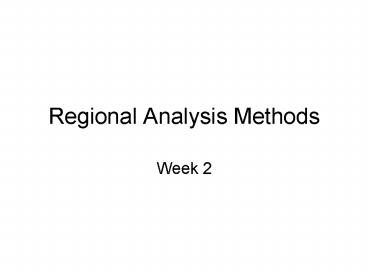Regional Analysis Methods PowerPoint PPT Presentation
1 / 14
Title: Regional Analysis Methods
1
Regional Analysis Methods
- Week 2
2
National vs. Regional Economies
- Methods of aggregate regional analysis are based
on theories and tools developed for national
economies because national and regional
economies can be viewed as being made up of the
same fundamental components and the same sorts of
relationships among those components - Examples
- International trade specialization of nations
- Interregional trade specialization of regions
3
Comparisons of National and Regional Economies
4
So what does these differences mean?
- Realistic regional planning requires an
understanding of the relationship of the region
to the national environment. - What kind of linkages between them?
- How that linkage affects the region, and vice
versa? - What appears to be good for the national may not
necessarily be good for the region and vice
versa. - The institutional tools available for regional
development are generally quite different at the
regional level from those available at the
national level. Ex. Printing money
5
Different Approaches in Regional Analysis
- Quantitative Approach
- Statistical Compendium, Econometric Models,
Quantitative Indexes - Qualitative Approach
- Interviews, Questionnaire, Participant
Observation (Detailed Discussion later Theme
Four) - Case Studies
- Theoretical Logics and Empirical Realities
6
Quantitative Approach Statistical Compendium 1
- Statistical Compendium Regional Profile
- A document made up of statistical tables, often
accompanied by diagrams, charts, maps, and
explanatory text, and covering a wide range of
subjects important to a preliminary understanding
of the regions unique nature - Function of compendium
- Presentation of the regions case to potential
funding agencies - Handbook of information on characteristics of the
region
7
Quantitative Approach Statistical Compendium 2
HINCO approach
8
Quantitative Approach Econometrical Approach 1
- Lange (1978)
- Econometrics is the science which deals with the
determination by statistical methods of concrete
quantitative laws occurring in economic life
9
Quantitative Approach Econometrical Approach 2
- Economic theory vs. econometrics
- Ex the impact of changes in the price of French
wine on the demand of Japanese wine - Economic theory by introducing the concept of
elasticity of demand with respect to the price of
the given commodity economic theory determines
general relations between the quantities under
study (e.g. a general rule on the substitution
commodity and the elasticity of demand) - Econometrics tries to establish the relations
between the quantities quantitatively and
concretely in the given economic situation
10
Quantitative Approach Econometrical Approach 3
- The Genesis and development of econometrics in
Western countries was during the period of the
growing power of monopoly and state capitalism - Econometrics studies served the needs of the
economic policy both of the capitalist state and
big private corporations - Three big questions in econometrics
- Forecast business cycles in the capitalist
economy - Market research elasticity of demand and supply
- Programming coordinating interdependent
activities
11
Quantitative Approach Indexes
- Characterize certain aspects of regional
economies - Location Quotient Relative Specialization of the
Region in selected industrial sectors - Ex. LQ of French Restaurant in Kunitachi
- XK as a fraction of XJ
- LQ ------------------------------
- RVK as a fraction of RVJ
- XK the number of French Restaurant in Kunitachi
- XJ the number of French Restaurant in Japan
- RVK Total Population of Kunitachi
- RVJ Total Population of Japan
12
Critiques on the Quantitative Methods in Social
Sciences 1
- When you cannot measure it, when you cannot
express it in numbers, your knowledge is of a
meager and unsatisfactory kind (Lord Kelvin) - When you can measure it, when you can express it
in numbers, your knowledge is still of a meager
and unsatisfactory kind (Jacob Viner)
13
Critiques on the Quantitative Methods in Social
Sciences 2
- Advocates of quantitative methods
- Mathematics as a precise, unambiguous language
which can extend our powers of deductive
reasoning far beyond that of purely verbal
methods the validity of mathematical reasoning
is a black-and-white affair. - Only if objects are qualitatively invariant, we
can analyze with quantitative methods - Asocial approaches
- No economic theory can avoid the issue of what
quantitative measures are measures of
14
Critiques on the Quantitative Methods in Social
Sciences 3
- A valid argument does not have to be true or
practically adequate and indeed may be quite
nonsensical. - A model is free from mathematical errors say
nothing about whether it is applicable to the
world. (Sayer 1984 Ch 6 p. 158)

